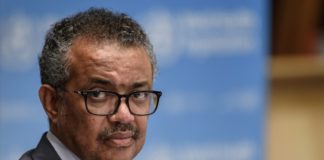Undocumented immigrants living with HIV/AIDS in New York State are eligible to enroll in uninsured care programs that provide access to free HIV and/or AIDS care. Here is a step-by-step explanation.

NYC Dept. of Health and Mental Hygiene
A public health campaign to publicize PrEP, a drug to help prevent HIV.
This article originally appeared in Spanish. Lea la versión en español aquí.
New York State provides health care services to all persons, regardless of immigration status, who have or have been exposed to the human immunodeficiency virus (HIV) and/or have developed acquired immunodeficiency syndrome (AIDS).
Lack of health insurance is not an impediment to accessing medications and medical check-ups. New York State has programs for uninsured people with HIV/AIDS, and the AIDS Institute has programs for New Yorkers living with HIV/AIDS to provide them medical services and medications to improve their health and quality of life.
In 2019, the city’s Health Department recorded 1,772 new HIV cases, down 8 percent from the previous year, according to the most recent data. Despite the decline, profound inequities remain: That year, 91 percent of newly diagnosed women and 81 percent of newly diagnosed men were Black or Latino the city says.
After consulting with several service providers, City Limits prepared this guide on resources for undocumented immigrants with HIV and/or AIDS in New York.
How can undocumented immigrants access treatment for HIV or AIDS in NY?
There is a drug assistance program for HIV/AIDS medications called AIDS Drug Assistance Program (ADAP), which basically covers medications at no cost. Importantly, “participation in this program will not affect any future immigration status,” says Guillermo Chacón, president of the Latino Commission on AIDS.
The ADAP program began in 1987 as part of a national initiative to provide free HIV/AIDS medications to low-income people.
What are the requirements to join ADAP?
There are three requirements: The first is having HIV or being at risk of acquiring the infection.
The second is residency in New York State and the third is financial need, i.e., if the person earns less than 500 percent of the Federal Poverty Level (FPL).
By applying for ADAP, you can also apply for ADAP Plus, “an HIV-limited insurance,” explains Dr. Rona M. Vail, Callen-Lorde’s clinical director of HIV services. The complete list of services covered by ADAP Plus is here. Enrollment is quick.
“People can get into this program in 24 hours or even the same day,” says Dr. Vera Antonios, Harlem United’s medical director.
Registration is done quickly since health experts recommend starting treatment as soon as possible once a person is diagnosed. In 2016, a pilot program called RapidTx kicked off, providing immediate access to treatment for people newly diagnosed or returning to HIV care.
Where to get tested for HIV at low or no cost in New York?
“The NYC Health Department’s PlaySure Network is a citywide network of HIV testing sites, community-based organizations, and clinics working together to promote patient-specific approaches to sexual health and HIV prevention,” says a NYC Health Department spokesperson in an email.
This is the complete list of where to get tested for HIV in the five boroughs: Bronx, Brooklyn, Manhattan, Queens, and Staten Island.
Additionally, there are options such as pre-exposure prophylaxis, commonly called PrEP,a medication taken by people at risk for HIV to prevent transmission through sexual intercourse or injection drug use. When taken as prescribed, PrEP is very effective in preventing HIV.
Currently, there are two ways to take PrEP: daily or on-demand (before and after sex). More details for taking PrEP on-demand here.
What to do if you were exposed to HIV
Act fast: There is an emergency medication called post-exposure prophylaxis, commonly called PEP, which works best if taken immediately. A person should start PEP within 36 hours but no later than 72 hours after a possible exposure to HIV.
You can reach the NYC PEP hotline here: 844-373-7692. A list of clinics and health centers that offer PEP is available here (as of June 21, 2021, so it is recommended to call ahead to confirm hours and services). The Health Department updates these online directories on an ongoing basis, a spokesperson said.
Where can one enroll in these programs?
Many of the organizations that test for HIV also assist in applying for ADAP and ADAP Plus and help connect with other organizations that provide other services.
The following is a shortlist of organizations that might be helpful:
- AIDS Center of Queens County (ACQC):
Phone: 718-896-2500
Services: HIV, ADAP.
- APICHA Community Health Center:
Phone: 646-744-2591
Services: HIV Care, PrEP and PEP Services, Medical Care
- Callen-Lorde Community Health Center:
Phone: 212-241-7200
Services: PrEP, HIV,
- Housing Works:
Phone: 212-465-8304 (in Chelsea), 212-677-7999 (in Lower East side), 718-277-0386 (in East New York), 929-509-0914 (in Downtown Brooklyn).
Services: HIV, PrEP/PEP (including same-day emergency PEP services)
- Community Health Network (CHN)
Phone: 212-477-1120 (Lower East Side), 718-523-2123 (Jamaica)
Services: HIV testing.
Phone: 718-287-2600
Phone: 212-367-1327
- Dominican Women’s Development Center
Phone: 212-994-6060.
- Latino Commission on AIDS.
Phone: 212-675-3288 Ext: 301
- OASIS Latino LGBTS Wellness Center.
Phone: 917-438-0698
- Immigration Equality
Phone: 212-714-2904
What other resources are available for undocumented immigrants with HIV or AIDS?
“The NYC Department of Health and Mental Hygiene offers housing assistance through their Housing Opportunities for Persons with HIV/AIDS (HOPWA) program,” says Jesus Casado, Community Casework Manager at The Lesbian, Gay, Bisexual & Transgender Community Center.
The list of organizations that connect people with housing options is here and more information about the program is available here.There is also a food and nutrition program for Persons living with HIV/AIDS: more details here.









